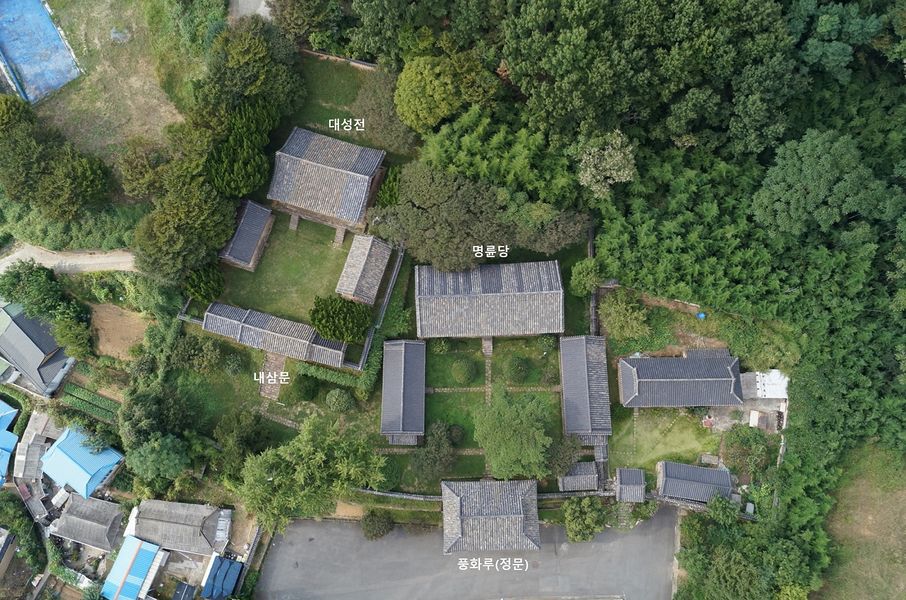밀양향교 대성전
| 밀양향교 대성전 Daeseongjeon Shrine of Miryanghyanggyo Local Confucian School |
|
 밀양향교 대성전, 국가문화유산포털, 문화재청. |
|
| 대표명칭 | 밀양향교 대성전 |
|---|---|
| 영문명칭 | Daeseongjeon Shrine of Miryanghyanggyo Local Confucian School |
| 한자 | 密陽鄕校 大成殿 |
| 주소 | 경상남도 밀양시 밀양향교3길 19 (교동) |
| 지정(등록) 종목 | 보물 제2094호 |
| 지정(등록)일 | 2020년 12월 28일 |
| 분류 | 유적건조물/교육문화/교육기관/향교 |
| 시대 | 조선시대 |
| 수량/면적 | 1동 |
| 웹사이트 | 밀양향교 대성전, 국가문화유산포털, 문화재청. |
해설문
국문
향교는 유교의 성현(聖賢)을 받들고 인재를 양성하기 위해 나라에서 지방에 설립한 교육기관이다. 밀양향교 대성전은 공자와 그의 제자, 중국과 우리나라의 이름 높은 유학자들의 위패를 모시고 제사를 지내는 공간이다.
임진왜란 때 불타 없어졌으나 밀양 부사 최기(崔沂)가 1602년 현재 위치로 옮겨 지었고, 부사 이현시(李玄始)가 1821년 고쳐 지었다. 정면 3칸, 측면 2칸 규모에 맞배지붕을 하고 있다.
대성전을 옮길 때 처마 끝의 무게를 받치면서 기둥으로 전달하는 공포(栱包)를 앞면은 새로 만들고 뒷면은 원래 있던 것을 활용했다. 200년 시차를 둔 조선 중ㆍ후기 건축 기술의 흐름과 특징을 한꺼번에 보여줌으로써 두 건축양식이 공존하는 미적, 역사적 가치를 지니고 있다.
제례 공간인 대성전과 교육 공간인 명륜당이 각기 다른 방향을 바라보도록 한 자리 배치는 국내에서 밀양향교가 유일하다. 매년 음력 2월과 8월에 석전대제를 봉행한다.
영문
Daeseongjeon Shrine of Miryanghyanggyo Local Confucian School
Daeseongjeon, meaning “Hall of the Great Sage,” is the main shrine of a local Confucian school. It houses the spirit tablets of Confucius and other Confucian sages and men of virtue.
Daeseongjeon Shrine of Miryanghyanggyo Local Confucian School was built in 1602 by the local magistrate Choe Gi (1553-1616) and repaired in 1821 by the local magistrate Yi Hyeon-si. The shrine's gable roof is supported by intricate brackets installed atop the pillars. The brackets along the front date to the 1821 repair, while those along the back are presumed to date to the 1602 construction. Thus, the building holds great aesthetic and historical value as it simultaneously shows the characteristic architectural techniques of both the early 17th and early 19th centuries. A veneration ritual for Confucius is held at the shrine in the second and eighth lunar months. Located in front of Daeseongjeon Shrine are two auxiliary shrines and an inner gate quarters, which together comprise the school's veneration area.
A local Confucian school, called hyanggyo in Korean, is a public education institution of the Goryeo (918-1392) and Joseon (1392-1910) periods. Such schools were established in jurisdictions across the country to promote Confucian education and nurture local elites while also serving as a local Confucian shrine. It is unknown exactly when Miryanghyanggyo Local Confucian School was first established, but the complex was destroyed during the Japanese invasions of 1592-1598 and rebuilt shortly thereafter.
A local Confucian typically consists of an education area in the front and a veneration area in the rear, with the two areas both facing the same direction. However, in accordance with the natural terrain, the veneration area of Miryanghyanggyo Local Confucian School is located to the rear left of the education area, with the veneration area facing south and the education area facing southeast. It is the only example of such a layout among local Confucian schools in Korea.
- 내용은 너무 왔다갔다 하는 것 같아서 이해하기가 어렵습니다. 향교에 대한 기본 설명은 대성전 해설문에도, 명륜당 해설문에도 쓸 수 있는 추가적인 내용이라서 대성전 설명 한 후 넣는 것이 더 좋을 것 같습니다. 방문객이 명륜당부터 볼 것 같으면 향교에 대한 기본 설명은 명륜당 해설문에 넣는 것이 오히려 낳을 것 같기도 해요.
- 동무, 서무, 내삼문채에 대해 독자가 궁금할 것 같아서 같이 언급했습니다.
- '조선 중ㆍ후기'와 220년까지 넣는 것이 문법적으로 좀 어려워서 17세기초, 19세기초로 바꿨습니다.
영문 해설 내용
대성전은 향교에서 유교 성현들의 위패를 모신 공간이다. 향교는 고려시대와 조선시대 지방에 설립된 국립교육기관으로, 공자를 비롯한 유교 성현들에게 제사를 지내고 지역 학생들에게 유교를 가르쳤다.
밀양향교는 언제 창건되었는지는 정확히 알 수 없으며, 임진왜란 때 소실되었다. 1602년 밀양부사 최기(1553-1616)가 지금의 자리에 대성전을 지었고, 1821년 부사 이현시가 고쳐 지었다. 매년 음력 2월과 8월에 석전대제를 봉행한다.
일반적으로 향교의 강학공간과 제향공간은 일직선상에 배치되며, 주 사당인 대성전은 경내에서 가장 높은 곳에 두어 위계를 나타낸다. 그러나 밀양향교는 서쪽이 높고 동쪽이 낮은 대지의 특성에 따라, 서쪽에 남향으로 제향공간을 두었고, 동쪽에 남동향으로 강학공간을 두었다. 제향공간과 강학공간을 나란히 두는 경우는 매우 드물고, 특히 대성전과 명륜당이 바라보는 방향이 다른 경우는 밀양향교가 유일하다.
대성전 기둥 위에는 지붕의 무게를 받치는 공포가 설치되어 있는데, 건물 앞면의 공포는 1821년 중건 때 만든 것이고, 뒷면의 공포는 1602년에 만든 것으로 추정된다. 220년의 시차를 둔 조선 중ㆍ후기 건축 기술의 특징을 한꺼번에 보여줌으로써 두 건축양식이 공존하는 미적, 역사적 가치를 지니고 있다.
갤러리
참고자료
- “안건번호 건축 2020-11-006 6. 밀양향교 대성전, 명륜당 국가지정문화재(보물) 지정 검토”, 2020년도 문화재위원회 제11차 건축문화재분과위원회 회의록. https://www.cha.go.kr/cop/bbs/selectBoardArticle.do?nttId=78178&bbsId=BBSMSTR_1019&mn=NS_03_03_04
